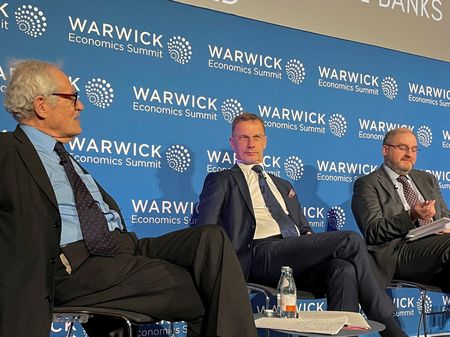FRANKFURT (Reuters) – The following are key quotes from a Reuters interview with Croatian central bank Governor and ECB policymaker Boris Vujcic.
* Economic and inflation developments remain in line with the baseline we projected in December. Any deviation is small. So, I would say so far so good, but we are coming up on a critical period in that core inflation should start to slow quite substantially in the coming months. Wage pressures and services inflation both are projected to fall and that is expected to bring down core inflation. This slowdown needs to happen for me to say I remain comfortable with our projections. Many services are typically repriced at the start of the year and we anticipate a significantly lower increase than last year.
* The market is pricing three more rate cuts this year. Given information we have today and the fact that inflation is developing along our projections, those expectations are not unreasonable. But as I said, we are just coming up on a critical period. For those rate cuts to materialise, we need to see a slowdown in core inflation and a slowdown in services inflation. The next three months will, thus, be very informative in terms of the economic data.
* The exchange rate is one factor we consider but, at the current level, it’s not something we need to worry about. A potentially bigger issue is that the pass-through effect may have changed. Our models on exchange rate pass-through are typically based on series of data which date back to a very low inflation environment. But we know that the pass-through is state dependent and will be different when inflation is low and when it’s high. So, you can expect that pass-through is higher now than it was over the past twenty years.
* Divergence with the Fed is not a financial stability risk at the moment. When monetary conditions diverge you have an exchange rate effect. But there is also a second impact via the bond market. When long-end yields rise in the U.S., investors will arbitrage that, which then tightens monetary conditions in Europe, too. The exchange rate impact and the yield rise work in opposite directions and they offset each other to some extent, if not fully. But, so far, we have not seen much of either exchange rate or bond market impact.
* Uncertainty around tariffs is immense and uncertainty has a negative impact on investment decisions. When it comes to setting policy, you need to know the exact nature of the tariffs. Without that sort of detail, you can’t estimate the impact. It’s a different situation if you have, let’s say, a blanket tariffs on everyone or if you have differentiated levels between countries, trading blocs or, and sectors. Retaliatory measures are equally, important. Specific structure of trade restrictions, be it tariffs or voluntary export restrictions or other non tariff barriers to trade determines an impact on output and inflation. The only reasonable option for monetary policy now is to wait to see what comes out of that uncertainty that we now face. But the sooner we have clarity, the better.
* The neutral rate is a good theoretical concept because it helps you to think about the economy and the impact of monetary policy. But this concept is not something that drives policymaking. We are not in a world where we can claim with absolute certainty where neutral is and set a calendar for when we want to get there. Neutral is both uncertain and it changes with time.
* The closer inflation gets to the target, in data and projections, the more intense the discussion gets about where to stop reducing rates. The same was true when we were raising interest rates. Early attempts, by some, to estimate the terminal rate proved far off the mark where we ended. And discussions intensified as we approached the peak. We are certainly getting close to the discussion on when we should remove “restrictive” from our language. It should happen when it’s no longer possible to say with full certainty that you’re still in the restrictive zone. This could already happen at our next meeting, but it will also depend on the incoming data.
* The closer we get to the target, the risks become more balanced. Balanced means there is a similar risk of overshooting and undershooting. We shouldn’t make too much of a fuss about this because it’s normal. It’s simply a consequence of the monetary policy, although not exclusively, outcomes.
* The European economy has been more or less stagnant for over a year. Growth is indeed weak, but I don’t see much of a risk for a recession. Then again, I also don’t see any rapid recovery happening. Consumption is where our projections have been off. However, the prerequisites for a recovery in consumption are there. Real incomes have caught up, savings are higher than before the pandemic and employment is high and stable. Why is consumption not recovering then? It’s probably related to downbeat sentiment, especially in some major economies. But that can change. As soon as you get a few months of more upbeat sentiment readings, consumption can accelerate because the conditions are in place.
* The labour market is holding up better than was widely anticipated. My interpretation is that businesses are hoarding labour, partly because they learned during the pandemic that it’s expensive to fire and rehire workers. However, companies have become a lot more flexible with their workforce. Often, it’s not headcount they reduce but hours worked. We see manufacturing firms in Croatia going to a four-day week instead of cutting headcount due to weak demand. Services firms are cutting daily hours meanwhile. This type of flexibility doesn’t show up in increased unemployment. And this is a good news. This sort of increased flexibility can hold up confidence because people will be less afraid of losing their jobs.
* More labour market flexibility also addressed the productivity issue, at least in part. Yes, productivity per employee is stagnant. But productivity per hour worked has increased in relative terms compared to pre-pandemic times.
(Reporting by Balazs Koranyi)










